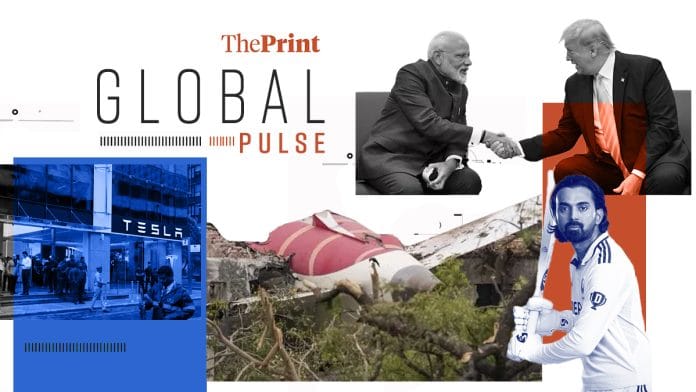New Delhi: New details in the probe of the Ahmedabad-London Air India plane crash last month draw focus to senior pilot, Sumeet Sabharwal, according to a Wall Street Journal report.
Andrew Tangel Shan Li and Aakash Hassan report that the black-box recording of the interaction between the two pilots indicates that it was the senior officer, who had “turned off” the fuel control switches in the final seconds before the crash, according to sources familiar with “US officials’ early assessment of evidence”.
“The first officer who was flying the Boeing 787 Dreamliner asked the more-experienced captain why he moved the switches to the “cutoff” position after it climbed off the runway, these people said. The first officer expressed surprise and then panicked, these people said, while the captain seemed to remain calm,” the report reads.
According to the report, people familiar with the matter said that “preliminary details have fuelled the belief among some US officials that criminal authorities should review the matter, as would likely be the case if the crash had occurred on American soil”.
It adds, “In the US, accident investigators historically have involved agencies such as the FBI if they believe a potential crime occurred, rather than a safety mishap.”
Bloomberg also reports on this detail, noting that the younger pilot “asked” the captain why he turned off the fuel supply switches.
“Aviation experts had speculated that it was first officer Clive Kunder who had posed the question to captain Sumeet Sabharwal given Kunder was the pilot flying and would have had his hands full—one on the yoke commanding the widebody into the skies, and the other on the throttle controlling the aircraft’s speed,” the report reads.
In an article in Foreign Affairs, Milan Vaishnav explains that “strategic altruism” has been propelling India’s relations with the US forward—an underlying philosophy that has dictated relations for the last two decades—which appears to be changing in Donald Trump’s second presidency.
“The second Trump administration is driven not so much by transactionalism as it is by an insatiable desire to burnish its dominance in virtually all its foreign relationships. Its dealings with India have been no exception,” he writes. “To preserve the relationship, it now falls to India—not the United States—to practice strategic altruism: making concessions to, generating deliverables for, and limiting what it asks of a US administration primarily concerned with maintaining the upper hand.”
The article further delves into how India faces a “new reality”, where it may have to “swallow the bitter pill of making sacrifices today for the promise of security and prosperity tomorrow”.
Vaishnav writes, “In this reversal, it is India—not the United States—that must embrace delayed reciprocity, delivering tangible benefits without expecting short-term returns. For a country that has long prized strategic autonomy, this posture is an uncomfortable departure, although perhaps a necessary one.”
Tesla has arrived in India with a base price of $79,089. In the US, it retails for $44,990. Acquiring a Tesla could simply be out of reach for Indians, reports Rajesh Roy for the Associated Press.
“Tesla will compete mostly with German luxury carmakers such as BMW and Mercedes Benz Group AG, and not budget Indian players like Tata Motors Ltd. and Mahindra & Mahindra Ltd. The luxury car market makes up just about 1% of total vehicle sales,” the report notes, adding that Elon Musk has confirmed that the carmaker “has no interest” in manufacturing in India.
Meanwhile, there’s an “unsolved mystery” that has plagued the India-England Test Series. Why is K.L. Rahul’s batting average so low?—asks Rob Smyth in The Guardian’s The Spin newsletter.
“All batters have a fallow period – but Rahul’s lasted the best part of six years. He averaged 26 from 28 Tests played between November 2017 and December 2023, including a desperate tour of England in 2018,” he writes.
Smyth adds, “He has never been good at squeezing metaphorical lemons. The great batters usually wring every run out of a spell of good form; Rahul has always flattered to deceive. The current England tour is the first time he has made two centuries in one series and only the second time he’s managed three 50+ scores. For a player of his ability, those statistics are downright offensive.”
The BBC looks at another mystery, one which has left Indian authorities bewildered. There is no clarity in the case of the Russian woman, who was found living in a cave in Karnataka with her two children. Her documents are invalid, and no one knows how she wound up living in snake-infested forest, report Geeta Pandey and Imran Qureshi.
“Police said when they told her that the cave was unsafe because of the presence of snakes and wild animals in the forest, she told them: ‘Animals and snakes are our friends. Humans are dangerous’,” reads the report.
(Edited by Mannat Chugh)






